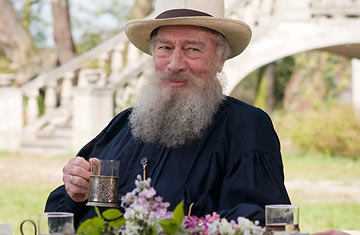
Christopher Plummer as Lev Tolstoy in The Last Station
The Last Station begins in 1910, when the Russian writer Leo Tolstoy is in his waning days but still greatly celebrated, as a novelist and the touchstone of a community of "Tolstoyans," passive resisters living virtuous lives based on his ideals. The words "Some even regard him as a living saint" appear on the screen, which is generally bad news for the living saint, especially if he's got a wife around to point out all the ways in which her husband is actually flesh and blood who never takes out the garbage.
In writer/director Michael Hoffman's adaptation of Jay Parini's historical novel, Leo Tolstoy is played in grizzly glory by Christopher Plummer. Helen Mirren portrays the mercurial Mrs. Tolstoy, Countess Sofya, who fears her husband — and their fortunes — will be carried out on the shoulders of sycophants. The pairing of these two giants explains why the film, which doesn't open nationwide until February, is making a brief Academy-qualifying appearance in theaters now.
They do not disappoint, although the movie, while effective in portraying the complications of any life lived publicly, is on the whole less eloquent than its principals. It is structured on the belief that we need an expository guide to get the complexities of the Tolstoy's life, offered in the form of Valentin Bulgakov (James McAvoy), a nervous, good-hearted young secretary sent to the Tolstoy's country estate to help Leo with his papers. Valentin arrives as a pawn of the Countess' sworn enemy, the exiled Chertkov (Paul Giamatti), who urges him to keep vigilant eye on the Countess, whom he describes as "very, very dangerous" (primarily because she opposes Chertkov's plan to get Tolstoy to sign away the copyrights to his work).
As anyone who enjoyed McAvoy in The Last King of Scotland, or Starter for 10 or even the absurd Wanted knows, he makes a charming tour guide of cinematic territories, whether it be the high court of Idi Amin, posh academics or sects of vengeful weavers. But enough is enough and Valentin ends up being the kind of guide who distracts more than he leads. He turns his metaphorical flashlight in our eyes, chatters on about himself and makes you long to slip away from the group, to steal some quiet time with the art — the Tolstoys — on your own.
His life among the Tolstoyans plays out as a parallel to Leo's. Arriving at their woodsy compound, Valentin cheerfully observes that it's a beautiful day. "Yes, but we'll pay for it," says the grumpy Sergeyenko (Patrick Kennedy). Except for a carnal handywoman named Masha (Kerry Condon), who serves as a mini-Sofya to Valentin's mini-Leo, the Tolstoyans are too busy trying to adhere to their standards — vegetarianism, living off the land, practicing celibacy — to appreciate either a beautiful day or the fact that Tolstoy himself doesn't live up to them.
And how could he stick with the vow of chastity when he's got Sofya around? Mirren makes her funny, irreverent and passionate. (Only she could pull off a seduction scene that includes clucking like a chicken.) Sofya has proved her devotion by bearing Leo 13 children and copying out his drafts of War and Peace by hand, six times. She's prone to manipulation, eavesdropping and temper. "I lost five children, why couldn't one of them have been you?" she snipes at their daughter Sasha (Anne-Marie Duff), who is in Chertkov's camp. Sofya is not generous. Yet Hoffman ultimately comes down on her side, favoring the constancy of years over the inconstancy of politics.
We're not so sure of Tolstoy's preferences. Throughout the movie, he wavers between Chertkov's will and Sofya's, but he never displays complete conviction toward either. As he waffles, our perspective shifts accordingly. Is this a writer who believes in power to the people and doesn't want to be nagged by his selfish wife in his last days? Or a confused old man, susceptible to flattery and not up to his own standards of mental agility?
For Plummer it's all of the above. Waffling is not a great source of dramatic tension, but watching a public man struggle to figure out his own best — and private — end is certainly affecting, and that's what Plummer gives us. By the time we get to the "Last Station" itself, the Astapovo railway station where Tolstoy died, Hoffman finally lets Valentin fade into the background and the focus rest on Leo and Sofya. What you carry away from the movie is the reminder that a deathbed is the place where the living stake their possession for the last time and then watch it evaporate in irrelevance. Not a bad end for an imperfect movie.
